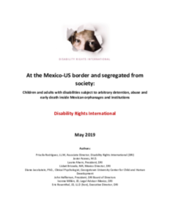Displaying 411 - 420 of 1459
In a sample of 136 Romanian children from the Bucharest Early Intervention Project (BEIP), who were exposed to early psychosocial deprivation in the form of institutional care, the authors of this study examined caregiver-reported and observer-rated signs of disinhibited social engagement disorder (DSED).
This study investigated what factors are associated with an improvement in quality of life (QoL) during residential stay for children and adolescents living in youth welfare institutions in Switzerland.
Using a phenomenological approach, this qualitative study explores the contexts of institutional placement of children in Azerbaijan from their caregivers' perspectives.
Despite the importance of training residential youth care professionals to increase their professional competences, little attention has been paid so far to the influence of training on the behaviour and skills of residential professionals. This study aims to gain greater insight into the effects of training on the skills of these professionals.
The objectives of this study were: (a) to measure the time-to-initial placement change in different types of settings, including non-relative foster homes, kinship care, residential treatment centers (RTC), group homes and other types of settings; and (b) to identify predictors of the initial placement change.
The goal of this study was to examine whether and how alternative kinship structures were reproduced in Charitable Children’s Institutions (CCIs) in Kenya.
This study focused on health promotion for children and young adults who live in residential care institutions in Portugal.
The objective of this research project was to profile the experiences of survivors abused in long-term child care in Scotland, and to develop a model which linked maltreatment, risk and protective factors, and outcomes.
Given the impact that institutional care has been found to have on psychological and cognitive outcomes, the authors make the case for the adaptation of Early Childhood Child Care HOME (EC-CC-HOME), a world-renowned instrument that assesses children’s child-care environment, to the Greek context.
Disability Rights International (DRI) carried out two investigation trips to Baja California, Mexico, in November 2018 and February 2019, visiting four residential, private institutions for children and adults – including migrants - with disabilities. This report presents the findings from these investigations.

